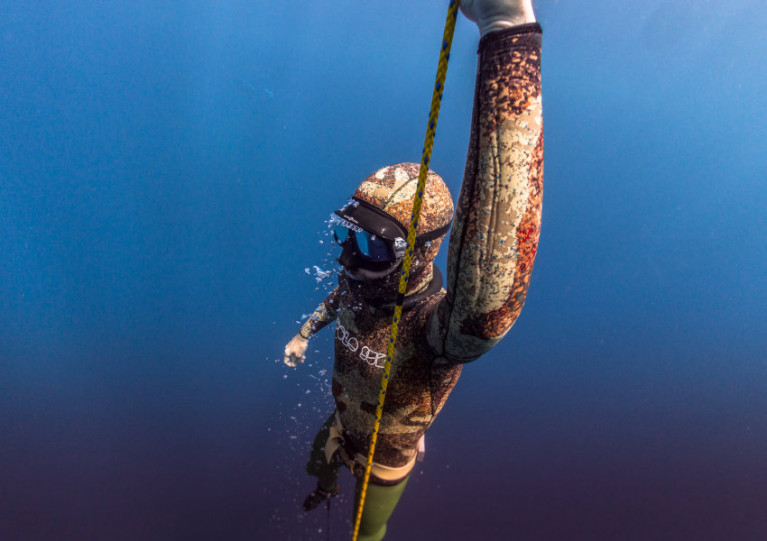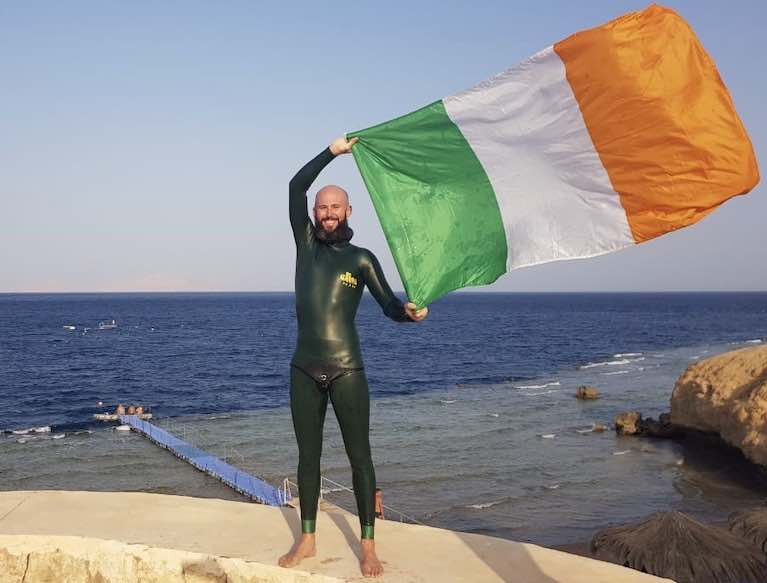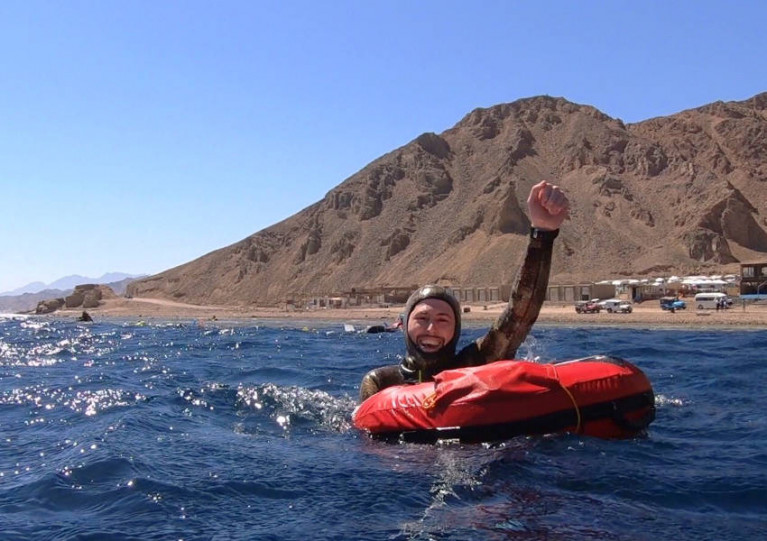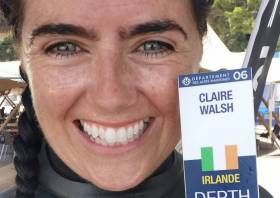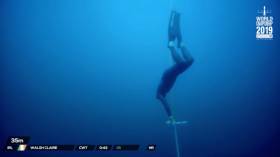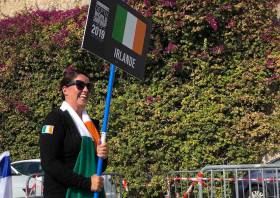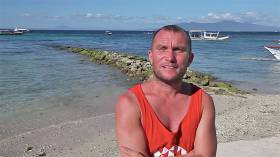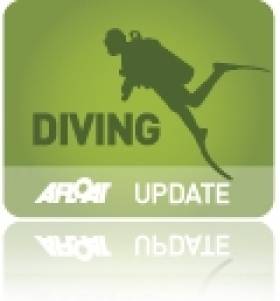Displaying items by tag: Free Diving
Balbriggan Free Diver Sets New World Record in Turkey
A Balbriggan woman has set a new world record in free diving, as the Northside People reports.
Nina McGowan logged the deepest ‘no fins’ dive ever recorded for her age category at the CMAS Outdoor Freediving World Championships in Kas, Turkey in early October.
Her warm-up dive of 43 metres beat the previous world record by three metres — and she went on to win gold in her Masters class at the event while setting two other national records.
“When my coach suggested a world record was within my reach, I thought it was a crazy,” McGowan (50) said of her achievement.
“But because water is both my sanctuary and playground, anything is possible. The limitations of the land do not apply.”
The Northside People has much more on the story HERE.
A new documentary celebrating one of the few women big wave surfers to conquer the incredible swells at Nazaré in Portugal is screening next weekend as part of the virtual Virgin Media Dublin International Film Festival.
BIGvsSMALL follows courageous Portuguese surfer Joana Andrade as she confronts her fears of the water, and takes on an unusual training programme in the frozen lakes of Finland with a champion free diver revered in her own right.
The film streams next Sunday 16 March from 4pm for a limited time for viewers on the island of Ireland, and includes a Q&A with the director Minna Dufton hosted by film-maker Claire Dix.
Irish Free Diver Plans Long Walk for Mental Health Charity
An Irish free diver in Egypt who last year sought public support for his competitive efforts is paying it forward with a plan to walk for 24 hours straight in aid of Pieta House.
Dave McGowan tells the Irish Examiner that his charitable challenge is just the latest in a series of adventures he’s been setting himself on his birthday each year.
This year he’s on his own in Dahab — where he’s based himself to train for the next level of international free diving competition, as previously reported on Afloat.ie.
But McGowan is well used to the solo rigours of long-distance cycling and running, as he comtemplates the 100km hike ahead this coming Thursday (4 February).
And mindful of the difficulties of the coronavirus pandemic affecting society both in Egypt and back home, the Mullingar man has selected a mental health charity for his fundraising efforts.
The Irish Examiner has more on the story HERE.
Irish Freediver Dave McGowan Makes Records in Egypt
Just over a week ago, from the 22nd to the 26th of September in the city of Sharm El-Sheikh, Egypt Irish freediver Dave McGowan attended the AIDA Freediving World Depth Competition, hosted by World Record holder Andrea Zuccari. McGowan's aim was to consolidate his training best performances in competition to secure his spot in the record books and become the most successful Freediver in Irish history.
Already on day one of the competition, McGowan had his sights set on the Irish record, however with this being McGowan's first depth competition, being held in unfamiliar surroundings and the unknown effect of how competition nerves would impact his performance, McGowan announced a relatively conservative dive to 65 metres in the newly recognised Bi-Fins disciple. In order to be the first to set a record in this discipline, McGowan needed to reach a depth of 61 meters (this corresponds to 75% of the Monofin depth record). McGowan completed the 65m dive in a time of 2 minutes and 2 seconds. This also secured his place as the second-ever deepest Irish Freediver.
 Irish Free diver Dave McGowan in action in Egypt. Freediving is a niche sport where the athletes hold their breath and swim down along a rope into the deep sea or perform multiple lengths of a swimming pool on one breath, there are currently 8 different recognised competition disciplines where records can be set.
Irish Free diver Dave McGowan in action in Egypt. Freediving is a niche sport where the athletes hold their breath and swim down along a rope into the deep sea or perform multiple lengths of a swimming pool on one breath, there are currently 8 different recognised competition disciplines where records can be set.
On day two of the competition conditions seemed to worsen, with strong swell and currents felt down to depths in excess of 40 metres. However, with freediving competitions, each diver must announce his dive the night before and cannot change the discipline or the depth without penalty or disqualification. A depth of 71 meters was McGowan's target, his personal best depth during training. Nerves were building in the morning with a long wait before his predefined dive time. The 'official top' was set for 15:00 and even though during the warm-up dives, there seemed to be a lot of commotion with other divers having trouble with the conditions, some even blacking out and needing to be rescued by the safety crew, McGowan kept his composure and at exactly 15:00 started his dive to 71 metres. and returned to the surface in a time of 2 minutes and 16 seconds.
The plan for the final two days of the competition was to continue with the Bi-fins discipline, increasing the record depth even further. However, with the challenging and changeable sea conditions, McGowan consulted with his Coach and training buddies and having already achieved far more than he set out to do in his very first depth competition, the decision was taken that it would be sensible to finish the competition with 4 successful dives and so the final 2 days would be conservative dives in other disciplines.
 Dahab, known throughout the world as the mecca for freediving, this town has been enticing freedivers from all over the globe for decades. The warm clear and deep waters, year-round sun and a friendly chilled out atmosphere are amongst the many attractions that keep drawing people back
Dahab, known throughout the world as the mecca for freediving, this town has been enticing freedivers from all over the globe for decades. The warm clear and deep waters, year-round sun and a friendly chilled out atmosphere are amongst the many attractions that keep drawing people back
The last two days saw McGowan complete a 66-metre dive in the Monofin discipline and a 70m dive in the Free Immersion discipline, both of these just happened to be personal best performances for McGowan.
Having only competed in 3 out of the 4 disciplines, McGowan was not holding out for a podium position, however to his surprise, due to the strength of his dives and not receiving any penalties, he narrowly missed out on 3rd place, finishing a respectable 4th overall.
With 4 strong dives logged in this competition, 2 new National Records, added to McGowans previous Irish Record in Static Apnea, secures him the top spot as most successful ever Irish Freediver.
McGowan had been training hard during the COVID lockdown in Dahab, Egypt and in order to raise the funds to attend this competition, had organised a GoFundMe. McGowan was quoted saying; "Without the help of all of the contributors to this fundraiser, these record attempts would just not have been possible and even though Freediving is an individual sport, this has very much been a collaborative effort. There is no way I could have achieved this without the help and support from everybody; friends, family, dive buddy's, mentors and everyone that was rooting for me over the last week and for that I am eternally grateful."
 As a gesture of thanks, McGowan added the names of each and every contributor to the fins he used to break the Irish Record
As a gesture of thanks, McGowan added the names of each and every contributor to the fins he used to break the Irish Record
McGowan's next big target is to continue his training over the winter, with the ultimate goal of representing Ireland at the Freediving Depth World Championships next autumn, and potentially setting some more Irish records along the way.
Irish Free Diver Appeals For Backing To Reach The Next Level
One of Ireland’s top free divers is appealing for public support to step up to the next level of competition.
Dave McGowan has been living and training in Dahab, Egypt since the start of the coronavirus crisis, and has made the most of his time to improve his dive distance to over 70 metres on a single breath — smashing the Irish record in the new bi-fins category.
It’s been a big boost of confidence for the Mullingar native who was unable to compete at last year’s Depth World Championships in the south of France due to a lack of funding.
Ireland was represented at that event by Claire Walsh, the first Irish woman to compete at that level and a record-breaker in her own right.
McGowan hopes to gradually improve his remarkable resuilys over the next few months, allowing his body to adjust to the immense pressures, in order to take on the all-time Irish depth record and confirm him as the deepest Irish free diver in active competition.
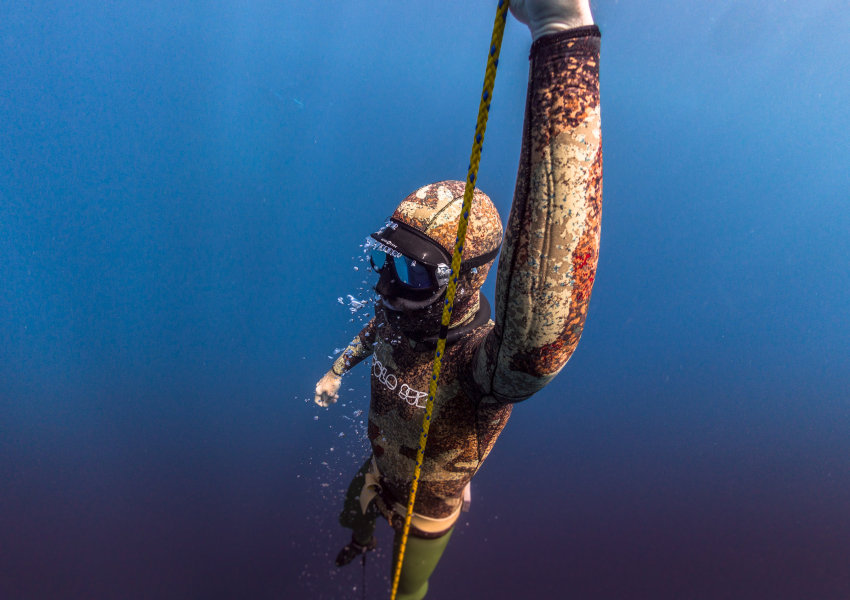
And he hopes to make his mark in local contests along the way, with the free diving season kicking off next month at the AIDA Bassam Arabian Freediving Depth Championship.
“I’m delighted with how my training has been going so far this year; however, my training and competition plans for the rest of 2020 and into 2021 are uncertain right now in the wake of the coronavirus crisis,” says McGowan.
“But it is hoped that by autumn 2021 it will be a distant memory and the next AIDA Depth World Championships can go ahead. It will be an incredible honour to represent Ireland at this event and even more to do so as part of a team.”
McGowan is looking to connect with any potential sponsors to help with his future record attempts, and has also set up a GoFundMe for anyone that wishes to help contribute to the costs of his training, equipment and competition fees.
Second National Record For Irish Free Diver In World Championship
Claire Walsh celebrated the finale of free diving’s world championship with a second national record within as many days.
The Kildare woman reached an Irish record depth of 44 metres in the free immersion dive yesterday (Saturday 14 September), an event that had to be rescheduled after poor weather on the Côte d’Azur last Tuesday.
The result came just two days after Walsh set an Irish record in the constant weight (CWT) discipline of 36 metres, and caps a remarkable end to a week that started with a disqualified dive and much uncertainty.
Walsh was Ireland’s first female competitor at the Aida Depth World Championship, held at Villefranche-sur-Mer outside Nice in the south of France.
Watch her record-setting immersion dive below:
Irish Woman Sets New National Free Diving Record In France
Claire Walsh’s second dive at the Aida Depth World Championship has seen her set a new Irish record, as RTÉ News reports.
Ireland’s first woman to compete in free diving's worlds reached a depth of 36 metres in the constant weight (CWT) discipline yesterday (Thursday 12 September).
The result came after an uncertain week for the 36-year-old from Kildare, whose first dive on Sunday was red-carded and whose second was postponed after poor weather on Tuesday.
She will look to top yesterday’s achievement in the rescheduled free immersion event tomorrow (Saturday 14 September).
RTÉ News has more on the story HERE. And watch her record-setting dive below:
Poor Weather Postpones Irish Free Diver’s Challenge In World Championship
Irish free diver Claire Walsh will have to wait a little longer to get back out on the water as the Aida Depth World Championship has been postponed due to heavy rains and thunderstorms in Nice today (Tuesday 10 September).
Today’s scheduled women’s immersion dives will now take place at the weekend with the men set to resume tomorrow, according to Deeper Blue.
Walsh’s first dive in yesterday’s constant weight no-fins (CNF) discipline, to a depth of 30 metres, was one of a high number handed red cards for technical infractions and she has yet to put any points on the board.
Ireland’s first female participant in free diving's worlds is also the national record holder with a depth of 44 metres, a bottom time of 50 sec and a dive time of 1 min 30 sec.
Ireland’s first female participant in the Freediving World Championships. Excited to be in Villefranche to cheer on @clairewalshlife ! pic.twitter.com/3Mdk9v7WTT
— Louise Byrne News (@LouiseByrneNews) September 7, 2019
Irish Free Diver Dies In Incident On Egyptian Coast
#Diving - Tributes have been paid to Irish free diver Stephen Keenan, who died on Saturday (22 July) in an incident off the coast of Egypt.
According to TheJournal.ie, the 39-year-old Dubliner — who ran a diving school in the resort town of Dahab — is believed to have been assisting another diver at the notorious Blue Hole when he got into difficulty.
Keenan was a renowned practitioner of free diving, an extreme variation on deep sea diving without using SCUBA gear.
Fellow free diver Feargus Callagy, previously featured on Afloat.ie, described Keenan as a “beautiful example of humanity”.
Irish Free Diver Pushes The Limits of The Human Body
#DIVING - An Irish free diver has told the Irish Examiner how he plunged the equivalent of a 15-storey building beneath the surface of the Red Sea on a single held breath.
Fergus Callagy's breathtaking feat is a highlight of a radio documentary about his extraordinary pastime, Fire and Water, which is available to listen on the RTÉ Radio 1 website.
The Sligo man - who says he can hold his breath for more than five minutes at a time - also recounts how he stunned experts at Sligo General Hospital by slowing his heart rate to an incredible 25 beats per minute - less than half the normal resting heart rate.
"It has been described as the most relaxing extreme sport," says Callagy of free diving, of which he is a leading light in Ireland. "When I got into [it] I started to admire what the human body can do."
The Irish Examiner has more on the story HERE.



























